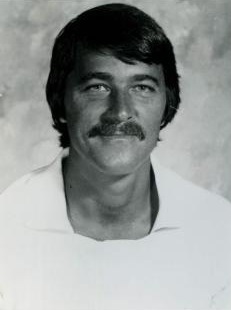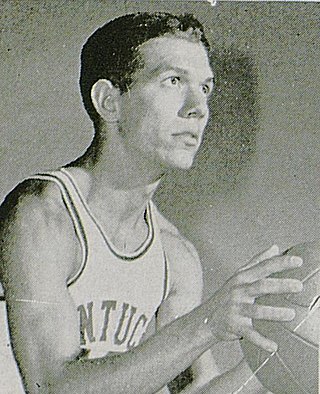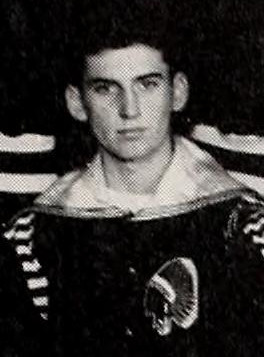The National Basketball League (NBL) was a professional basketball league in the United States. Established in 1935 as the Midwest Basketball Conference, it changed its name to the NBL in 1937. After the 1948–49 season, its twelfth, it merged with the Basketball Association of America (BAA) to create the National Basketball Association (NBA). Five current NBA teams trace their history back to the NBL: the Atlanta Hawks, the Detroit Pistons, the Los Angeles Lakers, the Philadelphia 76ers, and the Sacramento Kings.
Maurice Podoloff was an American lawyer and a basketball and ice hockey administrator. He served as the president of the Basketball Association of America (BAA) from 1946 to 1949, and the National Basketball Association (NBA) from 1949 to 1963, making Podoloff the de facto 1st commissioner in NBA history.

The Indianapolis Olympians were a founding National Basketball Association (NBA) team based in Indianapolis. They were founded in 1949 and folded in 1953. Their home arena was Butler Fieldhouse on the campus of Butler University, now known as Hinkle Fieldhouse.

The Washington Capitols were a former Basketball Association of America team based in Washington, D.C. from 1946 to 1951. The team was coached from 1946 to 1949 by NBA Hall of Famer Red Auerbach.

Alexander Murray Hannum was a professional basketball player and coach. Hannum coached two National Basketball Association (NBA) teams and one American Basketball Association (ABA) team to league championships. He had a combined NBA-ABA record of 649–564 (.535) in the regular season and 61–46 (.570) in the playoffs over 16 seasons. In 1998, he was inducted into the Naismith Memorial Basketball Hall of Fame as a coach.

Rodney Strickland is an American basketball coach and former professional basketball player. He is currently the head coach at Long Island University. Prior to LIU, he served as the program manager for the NBA G League's professional path. Strickland played college basketball for the DePaul Blue Demons, earning All-American honors. He had a long career in the National Basketball Association (NBA), playing from 1988 to 2005. Strickland was an assistant coach for the South Florida Bulls, under Orlando Antigua from 2014 to 2017. He formerly served in an administrative role for the University of Kentucky basketball team under head coach John Calipari and was the director of basketball operations at the University of Memphis under Calipari. He is the godfather of current NBA player Kyrie Irving. Strickland was inducted into the New York City Basketball Hall of Fame with the Class of 2008.

Louis Dampier is an American retired professional basketball player.

Ralph Milton Beard Jr. was an American collegiate and professional basketball player. He won two NCAA national basketball championships at the University of Kentucky and played two years in the National Basketball Association prior to being barred for life for his participation in the 1951 point shaving scandal.

Charles Stanley Albeck was an American professional basketball coach. Albeck coached for several teams in the American Basketball Association (ABA) and National Basketball Association (NBA), including the Denver Rockets, the San Diego Conquistadors,, the Cleveland Cavaliers, the San Antonio Spurs, the New Jersey Nets, and the Chicago Bulls.
Felton LaFrance Spencer was an American professional basketball player who was a center for the Minnesota Timberwolves, Utah Jazz, Orlando Magic, Golden State Warriors, San Antonio Spurs, and New York Knicks of the National Basketball Association (NBA) from 1990 to 2002.

Dwight "Bo" Lamar is a former professional American basketball player. Born and raised in Columbus, Ohio, he graduated from the University of Southwestern Louisiana, now the University of Louisiana at Lafayette. Lamar was a leading NCAA scorer and was the No. 1 overall pick in the 1973 American Basketball Association Draft.
The 1951 NBA All-Star Game was an exhibition basketball game played on March 2, 1951, at Boston Garden in Boston, home of the Boston Celtics. The game was the first edition of the National Basketball Association (NBA) All-Star Game and was played during the 1950–51 NBA season. The idea of holding an All-Star Game was conceived during a meeting between NBA President Maurice Podoloff, NBA publicity director Haskell Cohen and Boston Celtics owner Walter A. Brown. At that time, the basketball world had just been stunned by the college basketball point-shaving scandal. In order to regain public attention to the league, Cohen suggested the league to host an exhibition game featuring the league's best players, similar to the Major League Baseball's All-Star Game. Although most people, including Podoloff, were pessimistic about the idea, Brown remained confident that it would be a success. He even offered to host the game and to cover all the expenses or potential losses incurred from the game. The Eastern All-Stars team defeated the Western All-Stars team 111–94. Boston Celtics' Ed Macauley was named as the first NBA All-Star Game Most Valuable Player Award. The game became a success, drawing an attendance of 10,094, much higher than that season's average attendance of 3,500.
Eugene Stephen Rhodes was an American basketball player and coach.
The 1949 BAA draft was the third annual draft of the Basketball Association of America (BAA). The draft was held on March 21, 1949, before the 1949–50 season. In this draft, eleven BAA teams took turns selecting amateur U.S. college basketball players. The draft consisted of 8 rounds and a regional selection period, with 75 players selected. This was the final BAA Draft before the league merged with the National Basketball League to form the National Basketball Association (NBA) in August 1949. The 75 players selected matched the same number of players selected in the 1989 draft; both drafts have the fewest picks selected prior to 1989.
John David Douglas is a retired American professional basketball player who played in the National Basketball Association (NBA) for the San Diego Clippers.
The 1975-76 American Basketball Association season saw the San Diego Sails fold due to weak home attendance and other financial pressures; the team folded 11 games into the season.

William Edwin Spivey was an American basketball player. A 7 ft 0 in (2.13 m) center, he played college basketball for the National Collegiate Athletic Association's (NCAA) Kentucky Wildcats from 1949 to 1951. After his high school career, Spivey was recruited by the University of Kentucky. During his time with the Wildcats, he led the team to the 1951 NCAA tournament championship. When a point shaving scandal was revealed that year, Spivey was accused of being involved, which he denied. He left the Wildcats in December 1951, and the university banned him from the squad in March 1952.

The commissioner of the NBA is the chief executive of the National Basketball Association (NBA). The current commissioner is Adam Silver, who succeeded David Stern on February 1, 2014.
Jack Gordon Parkinson was an American basketball player who is one of few players in National Collegiate Athletic Association history to win both the National Invitation Tournament (1946) and the NCAA tournament (1948). He also played one season in the National Basketball Association.

Dale Barnstable was an American basketball player from Antioch, Illinois who was banned for life from the National Basketball Association (NBA) in 1951 for point shaving during his college career at the University of Kentucky.












